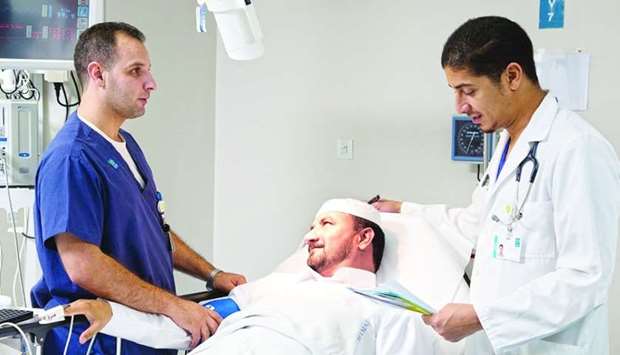In recognition of World Delirium Awareness Day, which is being marked today, the Hamad Medical Corporation’s Geriatric and Long-Term Care Department is leading a month-long campaign to inform and educate the general public, and healthcare professionals, about the common condition.
Dr Anand Kartha, senior consultant, General Medicine, at HMC, said delirium is a sudden mental change or decline in brain function that is mostly caused by acute illnesses, injuries (such as a hip fracture), major surgery, or drug-adverse effects or withdrawal.
“Delirium is a life-threatening medical emergency and is an independent risk factor for increased mortality, morbidity, and healthcare expenditure. Delirium can result in increased lengths of hospitalisation and long-term care requirements,” said Dr Kartha.
According to Dr Kartha, every 48 hours spent with delirium increases an individual’s mortality rate by 11%.
“Delirium represents a very rapid decline in brain function, which usually develops over hours or days. It is temporary, usually lasting a few days and is often reversible when identified and effectively managed. In comparison, dementia develops slowly, over months and years, and cannot be reversed,” he added.
“Delirium is much more common than people realise and affects up to 40% of older hospitalised patients. It is a common post-operative complication, occurring in around 15% of elderly patients following general surgery. It is often poorly identified and managed because the diagnosis of delirium is complicated as it is often linked with other chronic conditions that may have overlapping symptoms,” said Prof Stephen Thomas, chairman, Emergency Services, HMC.
Dr Ibrahim Mohamed Fawzy, director, Critical Care, HMC, says delirium is also common in patients admitted to the ICU but notes it is frequently under-diagnosed and can negatively influence prognosis.
“Approximately two out of three patients contract delirium in the ICU setting and seven out of ten patients develop delirium while they are on a breathing machine or soon after,” said Dr Fawzy, who is part of the recently formed National Delirium Steering Committee.
Dr Nicola Ryley, chief nursing officer at HMC says nurses are integral to preventing and identifying delirium, noting they play a vital role in assessing patients, identifying risk factors and symptoms, and implementing prevention strategies.
“Delirium can be prevented by optimisation of physiology, promoting orientation, rapid treatment of acute illness, correcting sensory impairments, and promoting natural sleep. Simple bedside nursing interventions can minimise the risk of delirium and enhance recovery in developed cases,” added Dr Ryley.
Dr Hanadi al-Hamad, chairperson of Geriatrics and Long-Term Care at HMC, and the National Health Strategy Lead for Healthy Aging, says delirium is complex and often multi-factorial and must be a global public health priority.
“Here in HMC, delirium care is given due priority and it is recognised that awareness is key to effective management. We have well-established awareness and training programmes. During the last year we ran 55 education events and activities across Qatar, training 3,840 healthcare staff and raising awareness in upwards of 4,500 people in the community,” said Dr al-Hamad.
“Delirium is a life-threatening medical emergency and is an independent risk factor for increased mortality, morbidity, and healthcare expenditure. Delirium can result in increased lengths of hospitalisation and long-term care requirements,” said Dr Kartha.
According to Dr Kartha, every 48 hours spent with delirium increases an individual’s mortality rate by 11%.
“Delirium represents a very rapid decline in brain function, which usually develops over hours or days. It is temporary, usually lasting a few days and is often reversible when identified and effectively managed. In comparison, dementia develops slowly, over months and years, and cannot be reversed,” he added.
“Delirium is much more common than people realise and affects up to 40% of older hospitalised patients. It is a common post-operative complication, occurring in around 15% of elderly patients following general surgery. It is often poorly identified and managed because the diagnosis of delirium is complicated as it is often linked with other chronic conditions that may have overlapping symptoms,” said Prof Stephen Thomas, chairman, Emergency Services, HMC.
Dr Ibrahim Mohamed Fawzy, director, Critical Care, HMC, says delirium is also common in patients admitted to the ICU but notes it is frequently under-diagnosed and can negatively influence prognosis.
“Approximately two out of three patients contract delirium in the ICU setting and seven out of ten patients develop delirium while they are on a breathing machine or soon after,” said Dr Fawzy, who is part of the recently formed National Delirium Steering Committee.
Dr Nicola Ryley, chief nursing officer at HMC says nurses are integral to preventing and identifying delirium, noting they play a vital role in assessing patients, identifying risk factors and symptoms, and implementing prevention strategies.
“Delirium can be prevented by optimisation of physiology, promoting orientation, rapid treatment of acute illness, correcting sensory impairments, and promoting natural sleep. Simple bedside nursing interventions can minimise the risk of delirium and enhance recovery in developed cases,” added Dr Ryley.
Dr Hanadi al-Hamad, chairperson of Geriatrics and Long-Term Care at HMC, and the National Health Strategy Lead for Healthy Aging, says delirium is complex and often multi-factorial and must be a global public health priority.
“Here in HMC, delirium care is given due priority and it is recognised that awareness is key to effective management. We have well-established awareness and training programmes. During the last year we ran 55 education events and activities across Qatar, training 3,840 healthcare staff and raising awareness in upwards of 4,500 people in the community,” said Dr al-Hamad.

